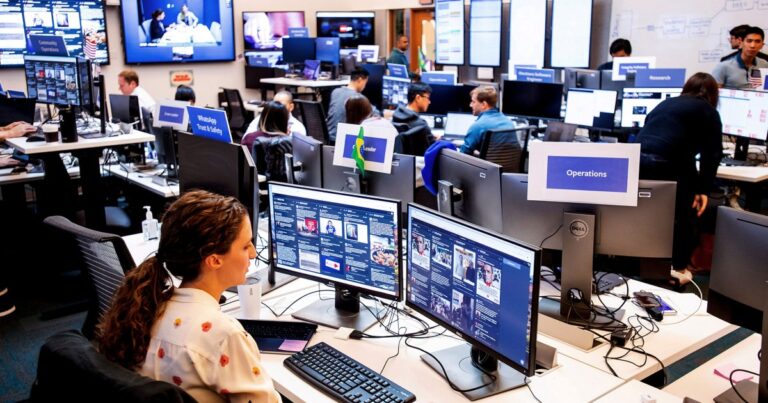Meta’s Shift Away from Diversity, Equity, and Inclusion Initiatives
Recent reports highlight significant changes at Meta regarding its approach to Diversity, Equity, and Inclusion (DEI) programs. The Intercept uncovered internal training materials indicating an expansion of permissible speech on the platform, raising questions about the implications of this shift. Phrasing such as “gays are weird” and “immigrants are dirty, dirty shit” are now reportedly accepted, indicating a troubling departure from the platform’s previous guidelines. These changes coincide with Meta’s decision to discontinue its DEI initiatives, which could affect the company’s internal culture and external commitments.
Decimation of DEI Programs
In a notable restructuring, Meta has announced it will cease to intentionally include diverse candidates in its job candidate pool, signaling a complete overhaul of its DEI strategy. This decision aligns with the company’s move to disband its internal DEI team entirely. Janelle Gale, the vice president of human resources, communicated this shift in a memo to employees, which has since been accessed by various news outlets. Gale stated that Chief Diversity Officer Maxine Williams would be reassigned to focus on accessibility and engagement, further indicating a pivot in the company’s priorities.
Removal of Supplier Diversity Programs
Moreover, Meta has rescinded its commitment to spend $1 billion annually on diverse suppliers, alongside eliminating an earmarked $100 million budget aimed specifically at Black-owned businesses. These significant reductions represent a broad disinvestment in programs meant to foster diversity within the supplier base. The company’s social media communications concerning supplier diversity have also reportedly been taken down, raising alarms about the future commitment to equity and inclusion in business practices.
Critique and Justification
The term DEI has faced scrutiny for allegedly favoring specific groups over others. The company aims to realign its philosophy, as noted by Gale, with a broader interpretation of serving “everyone,” instead of targeting specific underrepresented groups. Meta seeks to build initiatives that emphasize the reduction of bias affecting all employees, potentially obscuring racial or gender-based disparities in job representation. This shift reflects a complex balancing act because while striving for inclusion, the model could inadvertently sideline the very individuals the company aimed to uplift.
Public Reaction and Internal Sentiment
Following the recent announcements, internal employee reactions manifested fervently in the company’s communication platforms. Many expressed feelings of disappointment and betrayal, describing the changes as “upsetting” and “incredibly disturbing.” This internal discontent hints at a broader concern about the company’s transparency and long-standing commitments to promoting an equitable workplace culture.
A History of Commitment to Diversity
Historically, Meta has been a vocal advocate for DEI practices, publicly reporting diversity metrics since 2014. The company has articulated plans to enhance the support for underrepresented populations through employee engagement and product development efforts. However, there now appears to be a stark contrast between the company’s past commitments and its recent actions, leading stakeholders to reconsider Meta’s narrative around social responsibility.
Moving Forward
A spokesperson for Meta has confirmed the cessation of its DEI programs but has not clarified whether the company will continue compiling and publishing diversity metrics. The previous independent diversity reports have been phased out, and in their place, Meta has initiated the publication of responsible business practices reports, which encompass a wider array of company data. This continued evolution hints at a broader strategy of adapting to changing societal expectations and market pressures, though it raises questions about transparency and accountability.
Conclusion
The recent decisions made by Meta mark a significant turning point in the company’s approach to diversity, equity, and inclusion. As it moves away from its previous commitments and initiatives, the impact of these changes may resonate deeply within the company’s culture and its external relationships. Stakeholders, including employees and the communities Meta serves, will likely be watching closely to evaluate how these adjustments align with societal expectations around diversity and inclusion in the tech industry.
FAQs
Q: What prompted Meta to discontinue its DEI programs?
A: Meta has cited a desire to serve all employees equally rather than favoring certain groups, leading to a restructuring of their diversity initiatives.
Q: How has Meta’s internal culture reacted to these changes?
A: Many employees expressed disappointment and anger regarding the company’s reversal of its DEI commitments, indicating a significant backlash against the decisions.
Q: Will Meta continue to report on diversity metrics?
A: The company has not confirmed whether it will continue publishing diversity metrics, having moved away from independent reports in favor of broader responsible business practices reports.
Q: What changes have been made to Meta’s supplier diversity initiatives?
A: Meta has removed its commitment to spending $1 billion annually on diverse suppliers and has discontinued efforts focused on supporting Black-owned businesses.
Q: Who is leading the new focus on accessibility and engagement at Meta?
A: Maxine Williams, the former Chief Diversity Officer, will transition to a role centered on accessibility and engagement as part of the company’s restructuring efforts.



